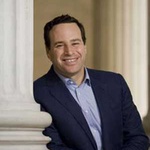
The Eisenhower Executive Office Building in Washington, D.C. is shown. Tupungato/Shutterstock.com
Advice for Those Weighing Jobs in the Trump Administration
Assessing the risks of service.
Some 40 people were indicted as a result of the Watergate scandal. Among those sentenced to prison: the attorney general of the United States, the White House counsel, and President Nixon’s two most senior White House aides. A dozen men were convicted or pled guilty to a range of charges after the Iran-Contra affair.
White Houses can be dangerous places under leadership that does not respect the law. When friends ask me, “Should I accept a job under President Trump?” it’s not merely a philosophical question. Answer the question wrong, and they may find themselves two or three years later facing a congressional investigation or possibly even a grand jury. Even those who never face charges—let alone conviction—can see their lives up-ended: As the saying goes, in Washington, the process is the punishment.
So how should a public-spirited person respond to an invitation to serve the country during the Trump years?
Let’s start by assessing the four basic risks:
1) This administration has begun its career by shredding post-Watergate ethical standards. Trump has not effectively severed his connections to his business interests. He will not release his tax returns. The Trump Organization seems—at best—indifferent to appearances of commercial exploitation of the presidency. Anybody in the vicinity of Trump's finances, or those of his family, stands in danger of being caught in some future scandal, including tax and corruption investigations.
2) There remain disturbing unanswered questions about the relationship between the Trump campaign and Russian spy services. The new national security adviser, Michael Flynn, accepted payments from RT, the Russian state propaganda network. (He has refused to disclose the amount.) The legal hazards presented by clandestine contacts with hostile foreign governments are even more alarming than those connected to financial wrongdoing.
3) This administration lies a lot. Lying by public officials is usually unethical, but not always illegal. As White House senior counselor Kellyanne Conway said during the Trump transition: “Nobody on TV is ever under oath.” But there are times when administration officials do speak under oath. Lying then becomes perjury. Lying to Congress is always illegal, whether under oath or not. People who habitually lie, lie habitually. Those who work with them can face trouble, even possibly obstruction of charges if they enable such lying: President Clinton’s White House counsel Bernie Nussbaum had to resign under fire in 1994 after other government officials alleged that his legal advice in the Whitewater matter amounted to the organization of a coverup.
4) Sometimes new administrations find themselves obliged to execute laws they disagree with. Changing the law can be slow. Ignoring the law takes much less time—but also opens the door to trouble. Ronald Reagan’s first EPA chief, Ann Gorsuch, entered history in 1982 as the first agency head to be cited for contempt of Congress. Gorsuch believed that the Carter administration had imposed excessive regulatory burdens. So she simply disregarded them. Convinced, for example, that the inherited rules on lead standards in gasoline were too onerous, she assured one refiner that she would leave the rule unenforced until such time as it could be amended. Gorsuch not only ended in disgrace herself, but embroiled two of her subordinates in perjury investigations.
So what is a patriotic American who’s been asked to serve to do? A few suggestions.
A law-abiding person will want to stay as far as possible from the personal service of President Trump. As demonstrated by the sad example of Press Secretary Sean Spicer spouting glaring lies on his first day on the job, this president will demand that his aides do improper things—and the low standards of integrity in Trump's entourage create a culture of conformity to those demands.
A wise patriot might be wary of working directly for or near Flynn or anybody else tied to the Russian state, the entities it controls, or Russian business interests. The National Security Council staff has engorged itself to such an enormous size in recent years—now some 400 people—that there are many important roles to fill, safely firewalled away from Flynn.
At the other departments or agencies of government, here’s the test: Odds are that the department or agency head will sooner or later be called upon to some improper thing at some point during the Trump administration. Do you trust him or her to say “No”? If not, you may find that improper demand relayed to you—or, even more ominously, you may find yourself involved in actions whose impropriety you only discover too late.
Donald Trump or no Donald Trump, the government of the United States must carry on. As a general rule, those asked to serve in national security roles—or other roles away from the White House—should do so, as long as they honorably and legally can.
If confronted with an improper or unethical situation, nobody need rush into career martyrdom. One of the heroes of Watergate—IRS Commissioner Johnnie Mac Walters—was asked to investigate individuals on Nixon’s “enemies list.” Walters, and his boss George Shultz, refused. Good people can do the right thing even under pressure. But be aware: The pressure to do the wrong thing can be intense—and the closer one approaches to the center of presidential power and prestige, the more intense the pressure becomes. It’s easy to imagine that you’d emulate Walters when reading the book he wrote four decades after the fact. But in the moment? In the Oval Office? Face to face with the president of the United States?
So maybe the very first thing to consider, if the invitation comes, is this: How well do you know yourself? How sure are you that you indeed would say no?
And then humbly consider this second troubling question: If the Trump administration were as convinced as you are that you would do the right thing—would they have asked you in the first place?







